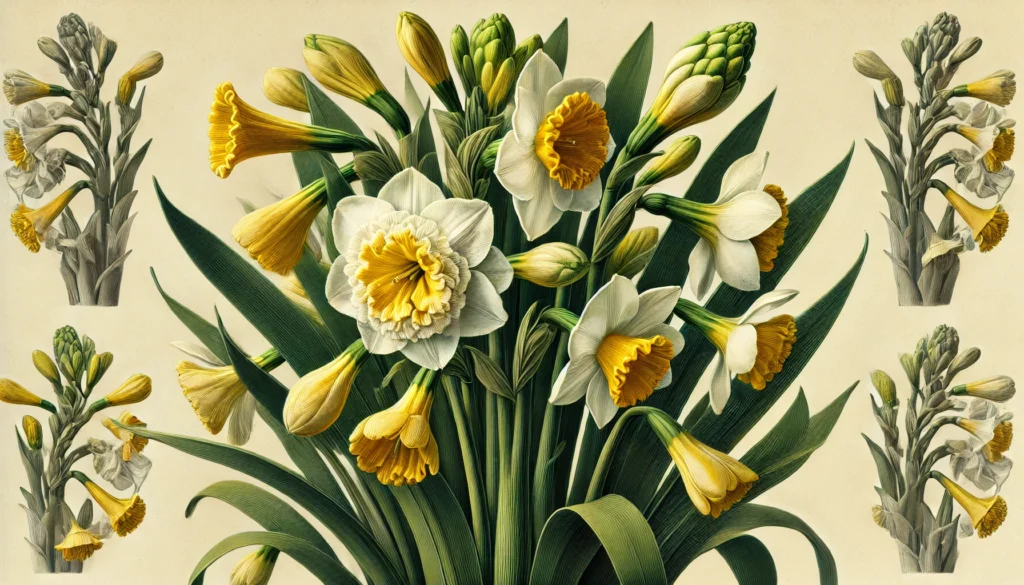

Home » Cat Plants » The Harm the Jonquil Plant Can Cause to Cats

The jonquil plant, also known as Narcissus jonquilla, is a popular spring-flowering bulb that can be harmful to cats if ingested. While not highly toxic, the jonquil contains alkaloids that can cause gastrointestinal upset and other symptoms in felines.
This plant is commonly found in gardens, as potted plants, and in floral arrangements.
Ingestion may cause mild gastrointestinal upset, but is generally not life-threatening.
Ingestion can result in mild symptoms like vomiting, diarrhea, or drooling. Rarely fatal but may require veterinary care.
Eating these plants can lead to more pronounced symptoms like abdominal pain, lethargy, or difficulty breathing. Veterinary intervention may be necessary.
Ingesting even small amounts can cause severe symptoms like organ damage, seizures, or cardiac failure without rapid treatment.
All parts of these plants are extremely poisonous to cats and can quickly lead to death, even with immediate veterinary care.
** Please note: Please note that toxicity level can vary based on the amount ingested and the specific cat. It's always best to keep these plants completely inaccessible to cats and seek immediate veterinary care or call the poison hotline if you suspect your cat has ingested any part of a toxic plant.
If your cat has ingested any part of the jonquil plant, they may experience various symptoms due to the toxic alkaloids present in the plant. These symptoms can range from mild to moderate, depending on the amount consumed. Some common signs that your cat may exhibit include:
If you suspect your cat has eaten a jonquil plant and is showing any of these symptoms, contact your veterinarian immediately for proper diagnosis and treatment.
When you bring your cat to the veterinarian with suspected jonquil plant poisoning, they will perform a thorough examination and ask questions about your cat’s recent activities and potential exposure to toxic substances. The vet may follow these steps to diagnose and treat your cat:
With prompt veterinary care and appropriate treatment, most cats recover well from jonquil plant poisoning.

A: Yes, the Jonquil Plant (Narcissus jonquilla) is highly toxic to cats. It contains lycorine, a toxic alkaloid that can cause serious health issues when ingested by felines.
A: Symptoms of Jonquil poisoning in cats include vomiting, diarrhea, abdominal pain, drooling, and in severe cases, convulsions or low blood pressure.
A: Even small amounts of the Jonquil Plant can be harmful to cats, particularly the bulbs, which are the most toxic part of the plant.
A: If your cat consumes any part of the Jonquil Plant, contact your veterinarian immediately. Prompt treatment is essential to manage the toxic effects and prevent serious complications.
A: Yes, Jonquil poisoning can be fatal if not treated quickly. The toxins can lead to severe symptoms such as heart irregularities and respiratory failure.
A: Yes, safer alternatives include African Violets, Spider Plants, and Boston Ferns, which are non-toxic and safe for cats.
The jonquil, native to Spain and Portugal, has been cultivated since the 18th century. Named after the Spanish “junquillo” for its rush-like leaves, it spread across Europe and North America. Prized for its fragrant flowers, it became a popular garden plant and perfume ingredient.
Today, jonquils remain beloved for their early spring blooms and sweet scent. They symbolize various meanings across cultures, from desire to good luck. As part of the Narcissus genus, jonquils continue to captivate gardeners and perfumers alike, their legacy rooted in both horticulture and cultural significance.
Please note: The information shared in this post is for informational purposes only and should not be considered as veterinary medical advice.
🐾 A hilarious or heart-melting cat video
🐾 Our latest paws-on review of a cool cat toy